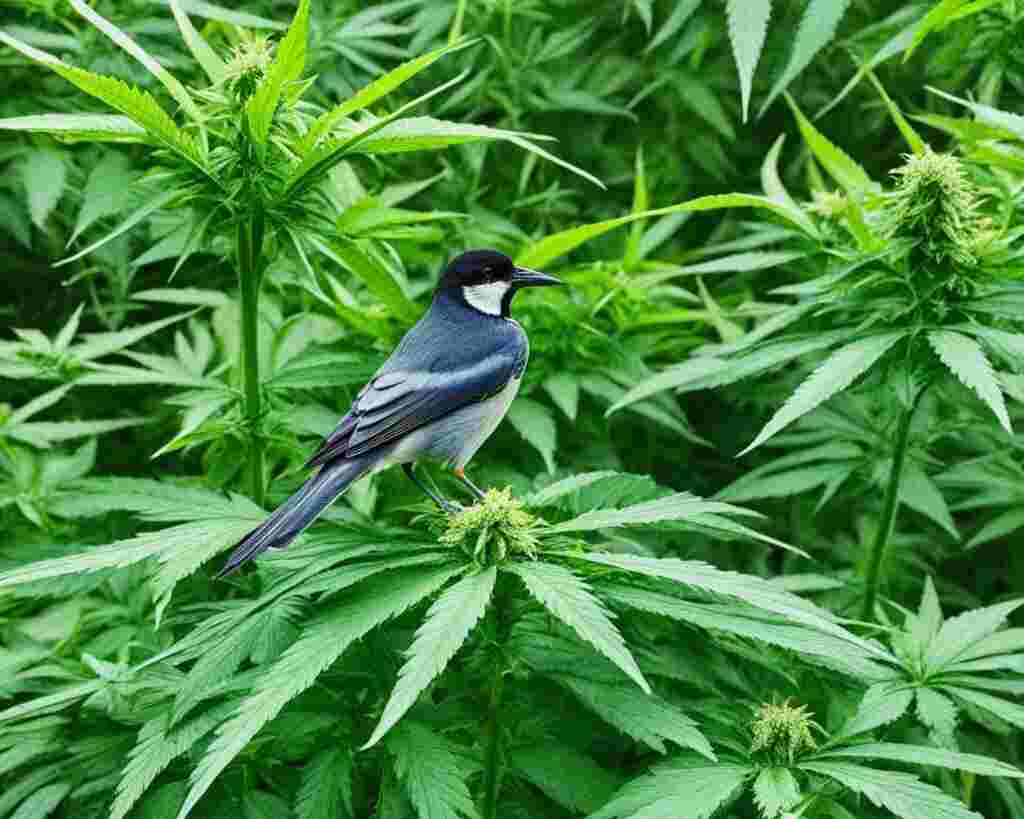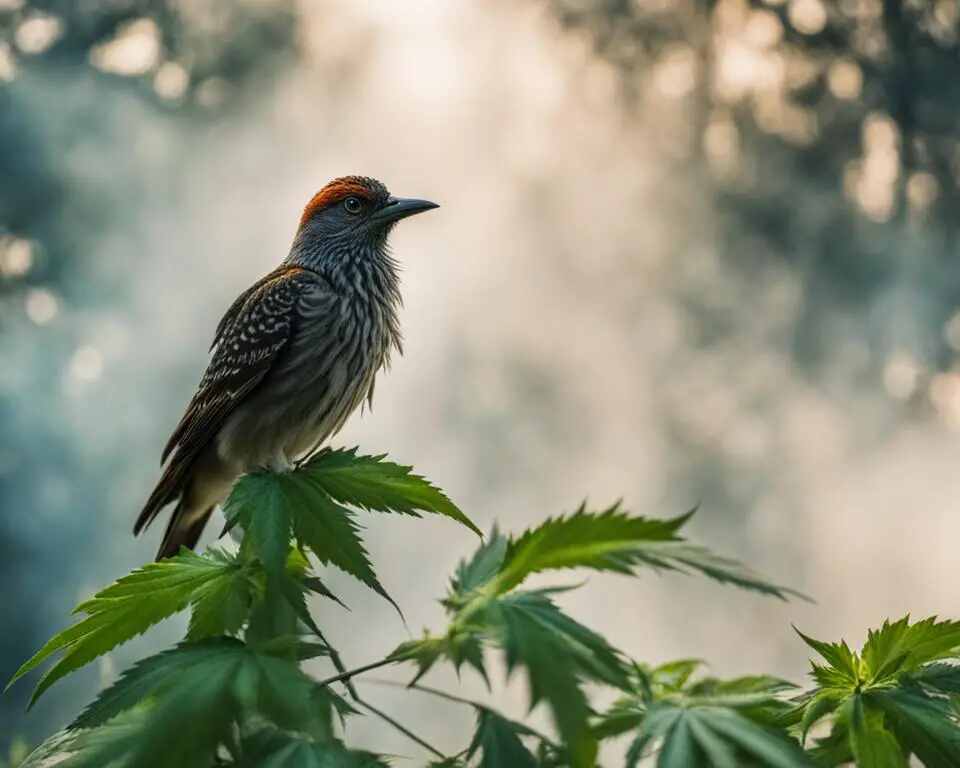As a bird enthusiast, I’ve pondered the question: Can birds get high from weed? With the rising popularity of cannabis, understanding its impact on bird health is crucial. In this article, I’ll explore the science, real-life observations, potential health risks, and the complexities of bird physiology related to THC ingestion.
By uncovering the facts, we promote responsible ownership and ensure the well-being of our avian companions. Let’s dive in and separate myths from reality!
Table of Contents
Key Takeaways:
- Birds have cannabinoid receptors similar to humans, allowing them to potentially experience the effects of marijuana.
- THC, the psychoactive compound in marijuana, can affect avian species and alter their behavior.
- Real-life observations and documented cases reveal that birds can exhibit adverse reactions to cannabis exposure.
- Marijuana consumption can pose health risks to birds, including intoxication and potential seizures.
- The complexities of bird physiology and THC ingestion require careful consideration for bird welfare and preventing cannabis consumption.
Understanding the Science: Can Birds Get High from Weed?
In order to determine whether birds can get high from weed, it is important to understand the science behind the interaction between marijuana and avian species. This section will look into the fascinating world of cannabinoids, exploring the presence of cannabinoid receptors in birds and the effects of THC (tetrahydrocannabinol) on these feathered creatures.
Cannabinoid Receptors in Birds
Similar to humans, birds possess cannabinoid receptors in their bodies, specifically in their brains and central nervous systems. These receptors, known as CB1 and CB2 receptors, play a crucial role in mediating the effects of THC and other cannabinoids. Despite some structural differences, these receptors are functionally similar in birds, suggesting that they may be responsive to the psychoactive compound found in marijuana.
How THC Affects Avian Species
When birds ingest or are exposed to THC, the compound binds to their cannabinoid receptors, leading to various physiological and behavioral changes. While the exact effects of THC on avian species are still being studied, it is believed that THC can alter bird behavior, perception, and sensory processing. The potency and duration of these effects may vary depending on the dosage, concentration, and individual bird characteristics.
Comparing Bird Reactions to Human Responses to Cannabis
While birds and humans share some similarities in cannabinoid receptors and responses to THC, there are distinct differences in their reactions to cannabis. Humans often experience euphoria, relaxation, altered perception of time, and increased appetite when consuming marijuana. However, the effects on birds may differ significantly due to their unique physiology and behavior. Further research is necessary to fully understand the nuances and intricacies of bird reactions to marijuana.
| Observed Behavior | Possible Effects |
|---|---|
| Increased aggression | Altered social dynamics within bird communities |
| Lethargy | Reduced activity and engagement |
| Hyperactivity and vocalizations | Excessive energy and noise levels |
| Subdued behavior | Lack of enthusiasm and decreased interaction |
Although the precise behavioral effects of marijuana on birds require further scientific investigation, it is important for bird owners and enthusiasts to be aware of the potential impacts and prioritize the well-being of their feathered companions.
Real-life Observations: Avian Reactions to Cannabis Exposure
Case Studies: Marijuana Toxicity in Birds
Real-life observations provide valuable insights into the avian reactions to cannabis exposure. Documented case studies offer specific examples of marijuana toxicity in birds, shedding light on the potential harm caused by cannabis ingestion.
One such case study involved a pet bird who accidentally consumed marijuana. The bird exhibited symptoms of intoxication, including disorientation, lack of balance, and decreased motor coordination. These observations suggest that marijuana can have adverse effects on avian species, affecting their behavior and overall well-being.
Anecdotal Evidence vs. Scientific Research
When assessing the impact of cannabis on birds, it is crucial to differentiate between anecdotal evidence and scientific research. Anecdotal evidence consists of personal accounts or stories, while scientific research involves rigorous studies conducted using standardized methodologies.
While anecdotal evidence may offer initial insights into avian reactions to cannabis, it is essential to consider the limitations of such accounts, such as potential biases and lack of scientific controls. Scientific research, on the other hand, provides a more reliable and comprehensive understanding of the effects of marijuana on birds. These studies involve controlled experiments and analysis, providing valuable data for drawing informed conclusions.
Therefore, to accurately understand the impact of cannabis on avian species, it is necessary to give more weight to scientific research, which follows rigorous methodologies and provides empirical evidence.
| Real-life Observations | Case Studies | Anecdotal Evidence vs. Scientific Research |
|---|---|---|
| Provide insights into avian reactions to cannabis | Highlight specific instances of marijuana toxicity in birds | Highlight the importance of distinguishing between anecdotal evidence and scientific research |
| Documented examples of changes in bird behavior after cannabis exposure | Examine the effects of marijuana ingestion on avian health | Evaluate the reliability and credibility of anecdotal evidence in understanding cannabis effects |
| Support the need for further scientific research on avian reactions to cannabis | Inform recommendations for bird owners regarding marijuana exposure | Emphasize the importance of evidence-based conclusions in assessing cannabis impact on birds |
Bird Health and Marijuana Consumption Risks
When it comes to birds and marijuana, there are potential risks to their health that should not be overlooked. While it may be tempting to share a recreational habit with our feathered friends, it’s important to consider the potential consequences of bird intoxication from marijuana ingestion.
Marijuana can have various effects on birds, including possible seizures and other health problems. The ingestion of cannabis can lead to intoxication in birds, causing abnormal behavior and impairing their overall well-being. As responsible bird owners, it is critical to prioritize their health and safety by avoiding exposing them to substances like marijuana.
While there may be some anecdotal evidence suggesting that birds can tolerate or even enjoy marijuana, scientific studies and expert opinions emphasize the significant risks associated with bird consumption of marijuana. The unique physiology of birds, including their sensitive respiratory systems, may make them more susceptible to adverse reactions when exposed to cannabis.
As the image above shows, bird health can be compromised when exposed to marijuana. This serves as a visual reminder of the importance of avoiding bird intoxication and prioritizing their well-being.
The Complexities of Bird Physiology and THC Ingestion
The Avian Respiratory System and Cannabis Smoke
Understanding the complexities of bird physiology is crucial in assessing the potential consequences of THC ingestion. One significant aspect to consider is the avian respiratory system and its interaction with cannabis smoke. Birds have a unique respiratory system, characterized by the presence of air sacs and a unidirectional airflow pattern, which differs from the human respiratory system.
When cannabis smoke is inhaled by birds, it can have several effects on their respiratory system. The smoke particles can irritate the delicate respiratory tissues, leading to inflammation and potential damage. Additionally, the presence of toxins in the smoke, such as carbon monoxide, can interfere with oxygen exchange and compromise respiratory function.
Proper understanding of how cannabis smoke affects the avian respiratory system is essential to ensure the well-being of birds in environments where marijuana consumption occurs. It is crucial for bird owners and enthusiasts to take preventative measures to minimize the risks associated with cannabis smoke exposure.
Consequences of Marijuana Ingestion on Bird Behavior
Ingesting marijuana can also have significant consequences on bird behavior. While limited scientific research exists on the behavioral effects of marijuana on birds specifically, anecdotal evidence suggests that it can lead to abnormal behavior and altered responses. Birds may exhibit changes in their activity levels, become lethargic, or display increased aggression.
The psychoactive properties of THC can potentially disrupt the neural pathways of birds, affecting their cognitive function, decision-making ability, and overall behavior. Additionally, the presence of other compounds in marijuana, such as pesticides or fertilizers, can further contribute to behavioral changes in birds.
Understanding the consequences of marijuana ingestion on bird behavior is crucial for maintaining the welfare and well-being of avian species. Bird owners and enthusiasts should be aware of the potential risks associated with marijuana exposure and take necessary precautions to provide a safe environment for their feathered companions.
Preventative Measures for Bird Welfare and Cannabis Consumption
To ensure the welfare of birds and minimize the risks associated with cannabis consumption, there are several preventative measures that can be implemented:
- Keep birds in a separate, well-ventilated area away from areas where marijuana is consumed to minimize exposure to cannabis smoke.
- Store marijuana products securely and out of reach of birds to prevent accidental ingestion.
- Dispose of marijuana waste properly to prevent birds from accessing discarded materials.
- Consult with avian veterinarians for guidance on bird safety and appropriate measures to mitigate potential risks.
By implementing these preventative measures, bird owners and enthusiasts can prioritize the welfare and well-being of their avian companions while also ensuring responsible and safe cannabis consumption.
Conclusion
In summary, after a comprehensive examination of the topic, it is clear that birds can indeed be affected by marijuana exposure. While research on the effects of cannabis on avian species is still limited, there is evidence to suggest that birds can display altered behavior and health issues when exposed to marijuana.
From the scientific understanding of cannabinoid receptors in birds to real-life observations and case studies, it is apparent that birds’ physiological systems can be impacted by THC ingestion. Marijuana consumption can lead to changes in bird behavior, including increased aggression or lethargy.
However, it is essential to prioritize bird welfare and make informed decisions regarding their exposure to marijuana. Considering the potential risks and complexities of bird physiology, it is advisable for bird owners and enthusiasts to avoid exposing birds to marijuana.
By understanding the potential impact of marijuana on bird health and behavior, we can take proactive measures to ensure the well-being of our feathered friends. Moving forward, further research and scientific studies in this area will provide a more comprehensive understanding of the effects of marijuana on birds.





